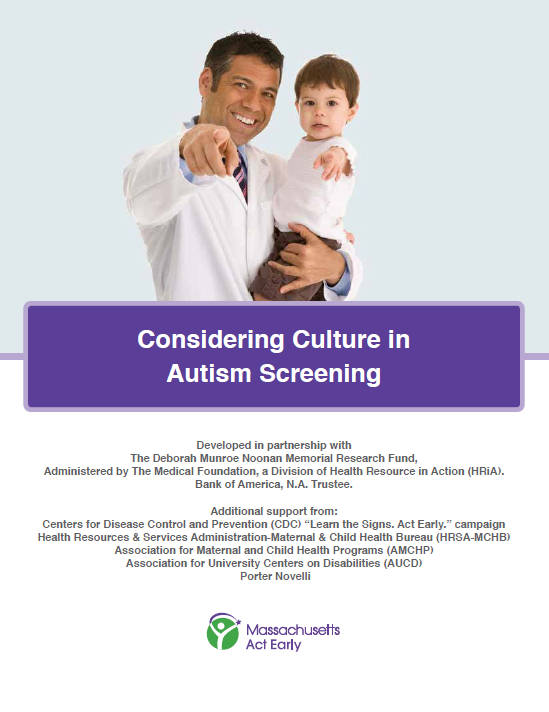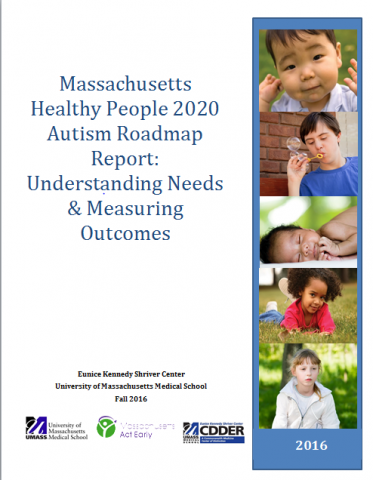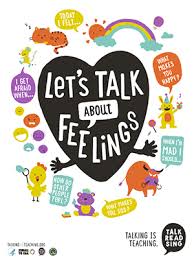|
Winter 2017 Issue
NEWS FROM ACT EARLY NETWORK PARTNERS |
Considering Culture in Autism Screening Kit & Curriculum Now Available Online  Providing full access to culturally-competent early identification practices for children from non-English speaking families has been a long-standing goal of the Massachusetts Act Early State Team. The team is pleased to announce that the Considering Culture in Autism Screening kit and curriculum is now available for download at no cost for pediatric providers and other early childhood professionals at http://www.maactearly.org/considering-culture-in-autism-screening.html. Providing full access to culturally-competent early identification practices for children from non-English speaking families has been a long-standing goal of the Massachusetts Act Early State Team. The team is pleased to announce that the Considering Culture in Autism Screening kit and curriculum is now available for download at no cost for pediatric providers and other early childhood professionals at http://www.maactearly.org/considering-culture-in-autism-screening.html.
The Considering Culture in Autism Screening Kit (funded by a 2012 AMCHP State Systems Grant) includes a clinician tips guide, referral resource listing, and translations of the M-CHAT-R/F autism screening tool. The Considering Culture in Autism Screening Curriculum (funded by a 2014 grant from the Deborah Monroe Noonan Memorial Research Fund) includes two cultural case studies, videotaped interviews from parents of children with ASD from four cultures, a facilitator training guide, and supplementary classroom materials. Modeled after the LTSAE Autism Case Training (ACT) curriculum, the project also received in-kind support from the CDC. To obtain access to the videos for use in training, please contact [email protected].
Citation: Gabovitch, E., Blenner, S., Braden, K., Choueiri, R., Charles, J., Fernandez-Pastrana, I., Helm, D.,& Travers, J. (2016). Considering Culture in Autism Screening: A Cultural & Linguistic Competence Training Curriculum for Pediatric Providers. [Curriculum]. Massachusetts Act Early Program, UMASS Medical School-Eunice Kennedy Shriver Center.
If you have questions, please contact the Principal Investigator/former CDC Act Early Ambassador to Massachusetts at [email protected].
. . . . . . . . . . . . . . . .
|
New Jersey's "Help Me Grow" - "Learn the Signs. Act Early." Child Developmental Passport  New Jersey's Child Developmental Passport is the product of the collaborative work between NJ's Act Early Ambassador and the NJ Help Me Grow and Early Childhood Comprehensive Systems Initiative of the NJ Department of Children and Families (NJ DCF). It is a tool that parents can use along with the Center for Disease Control's (CDC's) Milestones Moments booklet to track their child's health, wellness, and development. It includes: New Jersey's Child Developmental Passport is the product of the collaborative work between NJ's Act Early Ambassador and the NJ Help Me Grow and Early Childhood Comprehensive Systems Initiative of the NJ Department of Children and Families (NJ DCF). It is a tool that parents can use along with the Center for Disease Control's (CDC's) Milestones Moments booklet to track their child's health, wellness, and development. It includes:
• Definitions of Developmental Monitoring and Screening
• Well-Child Visit Tracker to track child's height, weight, immunizations, etc., and particularly head circumference which is critical information, given the current Zika crisis
• Developmental Tracker to track child's developmental and/or autism screening information including results and referrals for follow-up
• Notes Section to help keep track of child's growth and development
• Contact information for NJ Early Intervention, Project Child Find, Statewide Parent Advocacy Network (SPAN) - NJ's "one-stop" for families with children, and Help Me Grow NJ's Central Phone Line
The Passports are available in:
ENGLISH
SPANISH
For more information, contact: Deepa Srinivasavaradan
CDC's Act Early Ambassador to NJ SPA at [email protected] Ericka Dickerson, LSW HMG/ECCS Impact Program Manager NJ DCF at [email protected] or Nicole Hopkins HMG/ECCS Impact Program Assistant NJ DCF at [email protected]
. . . . . . . . . . . . . . . .
|
Tennessee's Act Early Collaboration  Tennessee's statewide Child Care Referral and Resource Network (CCR&R, led by Director Joyce Bridges) has partnered with the Centers for Disease Control and Prevention's (CDC) Act Early Ambassador to Tennessee (Dr. Toni Whitaker) to provide training on early developmental milestones and developmental screening to TN Department of Human Services licensed child care agencies and parents using the child care certificate program. Tennessee's statewide Child Care Referral and Resource Network (CCR&R, led by Director Joyce Bridges) has partnered with the Centers for Disease Control and Prevention's (CDC) Act Early Ambassador to Tennessee (Dr. Toni Whitaker) to provide training on early developmental milestones and developmental screening to TN Department of Human Services licensed child care agencies and parents using the child care certificate program.
The CCR&R Network's Fall 2016 training promoted the Act Early program in a train-the-trainer model. The session included presentations on helping child care professionals and the families they serve to recognize typical developmental milestones as well as an awareness of what to do when concerns arise. Trainers were oriented to and provided samples of Act Early resources.
Thanks to a State Systems grant from the Association of Maternal and Child Health Programs and supported by the CDC, CCR&R staff will take the Act Early message to all 95 counties in the state during the coming year. CCR&R is providing printed Act Early materials directly to child care agencies for their own use as well as distribution to families. The CCR&R staff will also interact directly with parents using the printed materials and the CDC website. Two trainings were delivered during January, 2017 and multiple technical assistance supports were given to parents during the same time frame.
. . . . . . . . . . . . . . . .
|
Mississippi Early Childhood Inclusion Center  The Institute for Disability Studies has contracted with the Mississippi Department of Human Services (MDHS) for the Mississippi Early Childhood Inclusion Center (MECIC). MECIC is a statewide program that provides quality training and technical assistance to early childhood educators who serve young children with disabilities in childcare centers and preschool programs. The Institute for Disability Studies has contracted with the Mississippi Department of Human Services (MDHS) for the Mississippi Early Childhood Inclusion Center (MECIC). MECIC is a statewide program that provides quality training and technical assistance to early childhood educators who serve young children with disabilities in childcare centers and preschool programs.
MECIC conducts two special needs credentials. The credentials are a 40-hour certificate program designated for preschool teachers and an additional credential specifically for infant and toddler teachers. Further, MECIC provides a program exclusively for early childhood directors on how to establish an on-going monitoring and developmental screening program in the early childhood environment. Lastly, MECIC serves parents and children by conducting developmental and Autism-specific screenings and provides on-going support to families through family navigation. Family navigation supports families who have developmental concerns for their child and are seeking support.
Dr. Leslie LaVergne, Mississippi's Act Early Ambassador and MECIC Coordinator will be working closely with MDHS and child care providers to encourage developmental monitoring for all children and creating awareness of the unique needs of families. "The Mississippi Early Childhood Inclusion Center, is eager to meet the needs of families and educators throughout Mississippi" said Dr. Alicia Westbrook, MECIC director.
. . . . . . . . . . . . . . . .
|
Minnesota Act Early Library Outreach  MNLEND Community Fellow Lucinda (Lucy) Wasserburg is sharing Act Early materials with county libraries around the Minneapolis-St. Paul metropolitan region. Lucy felt that libraries would be a great access point for families to learn about developmental milestones and took it on as a MNLEND project with MN Act Early Ambassador, Dr. Jennifer Hall-Lande. MNLEND Community Fellow Lucinda (Lucy) Wasserburg is sharing Act Early materials with county libraries around the Minneapolis-St. Paul metropolitan region. Lucy felt that libraries would be a great access point for families to learn about developmental milestones and took it on as a MNLEND project with MN Act Early Ambassador, Dr. Jennifer Hall-Lande.
Lucy scheduled meetings with coordinating librarians of youth programs of three large metro county library systems. They discussed ideas for displaying and distributing Act Early materials, such as hanging developmental milestone posters in nursing rooms, displaying developmental milestone trivia questions with brochures about development at checkout stations, and reading "Amazing Me" books at family story times.
One large metropolitan county, Hennepin, includes libraries throughout Minneapolis, and has 41 library branches where Act Early materials now are reaching thousands of families, many of whom are from culturally diverse communities. Lucy continues to follow up with the heads of youth services at the various county libraries to determine how to make Act Early materials most accessible to family visitors. Lucy's great systems-level thinking, creative initiative and "take action" approach exemplifies how MN Act Early and MNLEND collaborations are making a positive difference in our community.
. . . . . . . . . . . . . . . .
|
NEWS FROM THE ACT EARLY NETWORK |
HRSA-Funded Massachusetts Healthy People 2020 Autism Roadmap Report Shares State Act Early & Other Findings  In 2013, the Massachusetts Autism Commission issued a call to "determine the number of people with autism ... and their support needs by implementing a plan for consistent statewide data collection." In response, the University of Massachusetts Medical School-Eunice Kennedy Shriver Center and Massachusetts Act Early conducted a comprehensive 3-year state autism needs assessment using the framework of the six "Healthy People 2020" MCHB core outcome indicators for CYSHCN. As a result, the project's Massachusetts Healthy People 2020 Autism Roadmap Report provides recommendations for state autism data collection including future progress monitoring strategies and resources. In 2013, the Massachusetts Autism Commission issued a call to "determine the number of people with autism ... and their support needs by implementing a plan for consistent statewide data collection." In response, the University of Massachusetts Medical School-Eunice Kennedy Shriver Center and Massachusetts Act Early conducted a comprehensive 3-year state autism needs assessment using the framework of the six "Healthy People 2020" MCHB core outcome indicators for CYSHCN. As a result, the project's Massachusetts Healthy People 2020 Autism Roadmap Report provides recommendations for state autism data collection including future progress monitoring strategies and resources.
One of the indicators, Early Identification & Screening, is discussed at length and shares activities and outcomes from the MA Act Early state team's and related LTSAE efforts. The report includes several factors related to underserved children and youth: race, culture, language, immigrant status, region, level of function, and mental health. The report is available for download at: http://shriver.umassmed.edu/research/population-health/healthy-people-2020-roadmap.
Citation: Gabovitch, E., Lauer, E. & Dutra, C. (2016). Massachusetts Healthy People 2020 Autism Roadmap for Children & Youth with ASD/DD: Understanding Needs & Measuring Outcomes. [Report]. Worcester, MA: UMass Medical School-E.K. Shriver Center. If you have questions please feel free to contact the Principal Investigator/former CDC Act Early Ambassador to Massachusetts at [email protected].
. . . . . . . . . . . . . . . .
|
Improving Early Identification and Intervention for Children at Risk for Autism Spectrum Disorder  The statewide system change work of the South Carolina Act Early Team was published in the most recent issue of the journal Pediatrics. This article provides "an example of a successful, novel statewide effort to increase early identification of young children at risk for Autism Spectrum Disorder using a two-tiered screening process with enhanced quality assessment, interagency policy collaboration and coordination. It demonstrated that improvements in early identification and intervention are feasible through collaborative policy change in a manner that should be replicable in other states for the benefit of young children with ASD. For access to the full article, click here. The statewide system change work of the South Carolina Act Early Team was published in the most recent issue of the journal Pediatrics. This article provides "an example of a successful, novel statewide effort to increase early identification of young children at risk for Autism Spectrum Disorder using a two-tiered screening process with enhanced quality assessment, interagency policy collaboration and coordination. It demonstrated that improvements in early identification and intervention are feasible through collaborative policy change in a manner that should be replicable in other states for the benefit of young children with ASD. For access to the full article, click here.
OBJECTIVES: To provide and example of a successful, novel statewide effort to increase early identification of young children at risk for autism spectrum disorder (ASD) using a 2-tiered screening process with enhanced quality assessment, interagency policy collaboration and coordination.
METHODS: The South Carolina Act Early Team (SCAET) provided focused collaboration among leaders representing state agencies, universities, health care systems, private organizations, and families to improve quality of life for children with ASD. Specific focus was on implementing policy changes and training to result in earlier identification and home-based behavioral intervention for young children at risk for ASD.
RESULTS: Policy changes, training, and modified state agency practices were accomplished. Presumptive eligibility, on the basis of a 2-tiered screening process was implemented by BabyNet (South Carolina's Early Intervention Program) in collaboration with the lead agency for developmental disability services. There was a fivefold increase in children eligible for early intensive behavioral intervention without waiting for a diagnosis of ASD, avoiding long waits for diagnostic evaluations. Only 16 children (2.5%) were later found not to have ASD from a comprehensive evaluation.
CONCLUSIONS: Improvements in early identification and intervention are feasible through collaborative policy change. The South Carolina Act Early Team and its key stakeholders committed to improving outcomes for this population used existing tools and methods in new ways to improve early identification of children with ASD and to make available evidence-based intervention services. This example should be replicable in other states with key stakeholders working collaboratively for the benefit of young children with ASD.
Citation: Rotholz DA, Kinsman AM, Lacy KK, et al. Improving Early Identifi cation and Intervention for Children at Risk for Autism Spectrum Disorder. Pediatrics.2017;139(2):e20161061
. . . . . . . . . . . . . . . .
|
Massachusetts Act Early State Team Spring Conference and Summit 
Improving the Early Identification and Intervention of Neurodevelopmental Disorders and Autism in Underserved and Culturally Diverse Children on Friday April 21, 2017 UMass Medical School Worcester, MA Faculty Conference Room Sponsored by: MA Act Early; CDC Act Early campaign; UMass Memorial Children Medical Center (CMC) and Division of Developmental and Behavioral Pediatrics at the CMC
DESCRIPTION: This is a one-day conference and summit of the MA Act Early State Team for early childhood providers, advocates and healthcare providers. The conference will share important information about the CDC Act Early campaign and Learn the Signs Act Early materials (LTSAE), resources and important information about screening and monitoring of developmental milestones and early identification and treatment in young children from underserved communities. The conference will include keynote presentations by experts in autism screening and autism screening in minorities, as well as a language access attorney. MA,RI and NJ CDC Act Early Ambassadors will share their programs and updates and a panel including early childhood providers from Early Intervention, Women Infants and Children, Early Education and Care, and Head Start will highlight difficulties and strategies developed to reach underserved children.
TARGET AUDIENCE: This conference is designed for and will benefit early childhood educators, early childhood providers, health care providers and allied health care professionals working with young children.
REGISTRATION FEE: $25 Registration fee includes: admission to the day long symposium and activities, a light breakfast, lunch, morning and afternoon snacks; a parking voucher is also included. A certificate of attendance will be provided. Registration deadline: Wednesday April 10, 2017. For more information and to register, please read the registration form.pdf.
. . . . . . . . . . . . . . . .
|
Lack of Uniformity in Newborn Testing Under Review  A committee that advises the U.S. secretary of health and human services said Thursday it would study inconsistencies in newborn screening throughout the country, with the intent to give state public health labs guidance on how to better test newborns for genetic disorders. A committee that advises the U.S. secretary of health and human services said Thursday it would study inconsistencies in newborn screening throughout the country, with the intent to give state public health labs guidance on how to better test newborns for genetic disorders.
The action was prompted by a Milwaukee Journal Sentinel investigation late last year that found lab policies and protocols for newborn screening vary widely from state to state. As a result, babies can die or suffer brain damage when treatable genetic conditions aren't detected soon after birth.
The lack of uniformity means a child who suffers permanent brain damage in one state might have been diagnosed and treated in another, the investigation found. Each state runs its own program and sets its own standards to detect the disorders. To read the full article, please click here.
. . . . . . . . . . . . . . . .
|
Coupling Act Early Parent Resources with Vroom and Circle of Security to Enrich a Head Start Curriculum for Incarcerated Mothers  In Oregon, the Act Early Milestone Moments Booklet has been introduced into the Coffee Creek Head Start program. This along with Vroom activities and implementation of Circle of Security--Parenting sessions is a component of the Nurturing Healthy Attachment project at the Coffee Creek Women's Correctional Facility. The Coffee Creek Head Start is co-located at this women's correctional facility. Incarcerated mothers of infant, toddler and preschool age children attend the blended Early Head Start and Head Start classroom with their children.The Milestone Moments Booklet provides the mothers with a tool for learning about typical early childhood development and heightens their awareness of their child's developmental progress. In Oregon, the Act Early Milestone Moments Booklet has been introduced into the Coffee Creek Head Start program. This along with Vroom activities and implementation of Circle of Security--Parenting sessions is a component of the Nurturing Healthy Attachment project at the Coffee Creek Women's Correctional Facility. The Coffee Creek Head Start is co-located at this women's correctional facility. Incarcerated mothers of infant, toddler and preschool age children attend the blended Early Head Start and Head Start classroom with their children.The Milestone Moments Booklet provides the mothers with a tool for learning about typical early childhood development and heightens their awareness of their child's developmental progress.
Vroom provides a variety of activities promoting mother-child interaction. Circle of Security--Parenting builds the mother's capacity to interpret her child's behavior as an expression of emotional needs and respond appropriately. The Nurturing Healthy Attachment project pulls together these approaches to collectively promote secure attachment in this highly vulnerable population. Preliminary findings suggest that NHA may cultivate an empathic shift and further mother-child emotional engagement. For questions and further information please feel free to contact Sherri Alderman, CDC Act Early Ambassador to Oregon at [email protected].
. . . . . . . . . . . . . . . .
|
|
|
New AAP Program- Screening in Practices Initiative  The Screening in Practices Initiative is designed to improve the health, wellness, and life course of children through practice and system-based interventions for early childhood screening, referral, and follow-up. One of the major components of the Initiative is the National Technical Assistance Resource Center on Screening, which provides evidence-informed technical assistance and resources to assist practices in implementing effective screening, referral, and follow-up for developmental milestones, maternal depression, and social determinants of health. Technical assistance is provided through a toll-free hotline, in-person and web-based trainings, and an online resource center. The Screening in Practices Initiative is designed to improve the health, wellness, and life course of children through practice and system-based interventions for early childhood screening, referral, and follow-up. One of the major components of the Initiative is the National Technical Assistance Resource Center on Screening, which provides evidence-informed technical assistance and resources to assist practices in implementing effective screening, referral, and follow-up for developmental milestones, maternal depression, and social determinants of health. Technical assistance is provided through a toll-free hotline, in-person and web-based trainings, and an online resource center.
. . . . . . . . . . . . . . . .
|
Fostering Healthy Social and Emotional Development in Young Children Toolkit  The U.S. Departments of Education and Health and Human Services joined with Too Small to Fail to release a Fostering Healthy Social and Emotional Development in Young Children Toolkit on social and emotional development. The U.S. Departments of Education and Health and Human Services joined with Too Small to Fail to release a Fostering Healthy Social and Emotional Development in Young Children Toolkit on social and emotional development.
This set of resources on healthy social and emotional development includes:
• A tip sheet for parents and families of infants, toddlers, and preschoolers
• A tip sheet for infant, toddler, and preschool providers and educators
• A milestones chart with key information on social and emotional development from birth to age 5
• A fact sheet on the research behind social and emotional development in early childhood and lifelong outcomes
• A "Let's Talk About Feelings" poster
Joint HHS-ED Policy Statement to Support the Alignment of Health and Early Learning Systems. This statement provides policy and program recommendations from HHS and ED to improve young children's access to needed services and transform delivery systems to improve health and early learning outcomes for all children.
|
|
|


